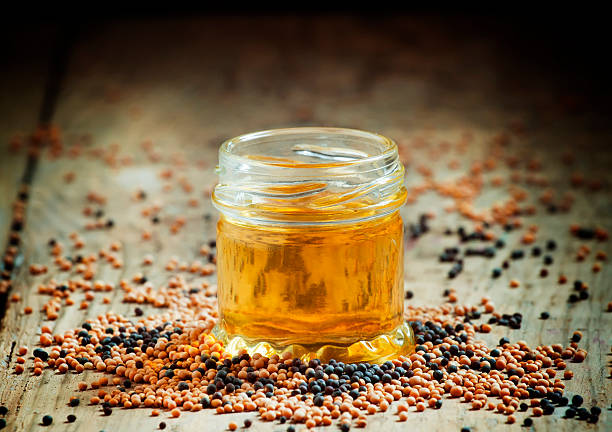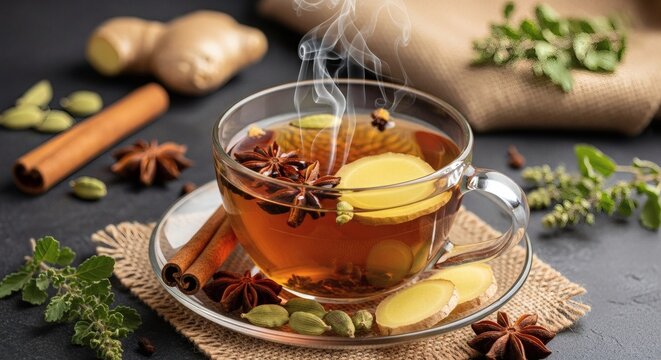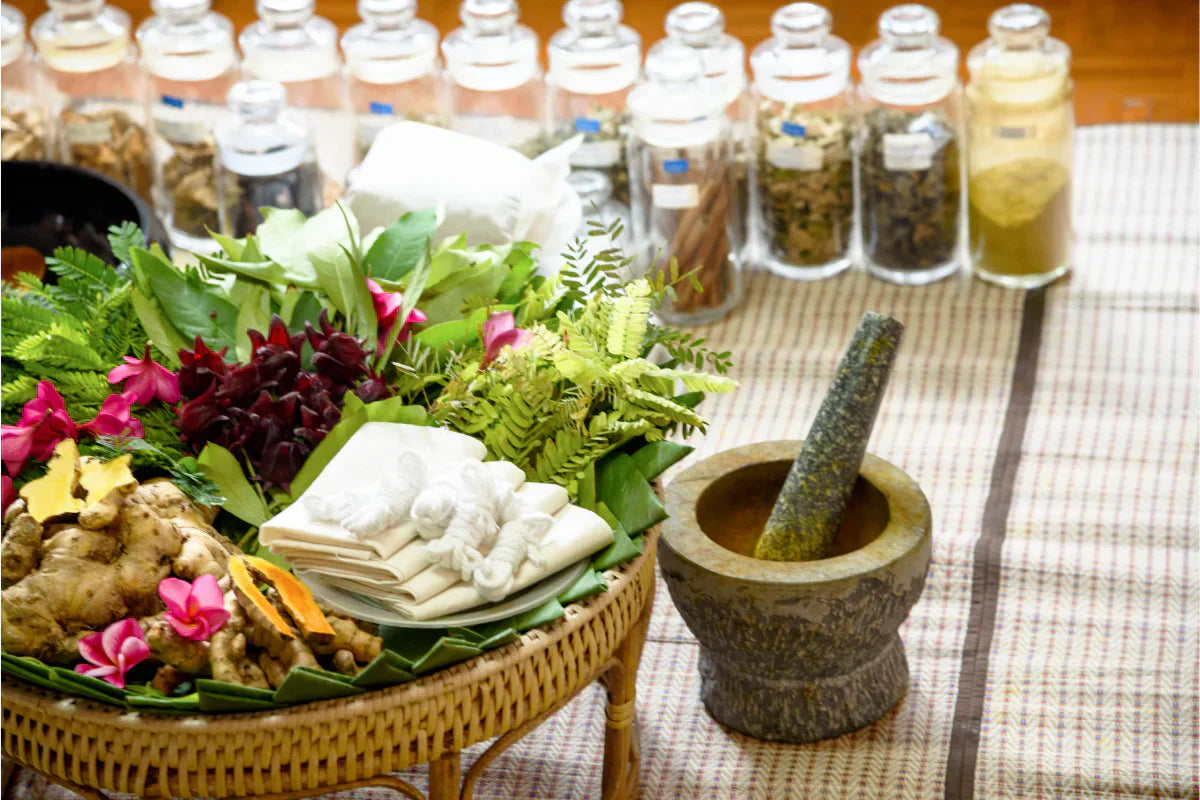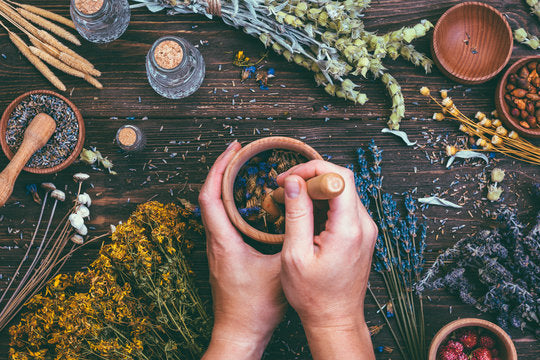The Ultimate Guide to Teas: Health Benefits & Choosing Tips

Introduction: Why Tea is More Than Just a Beverage
When most people think of tea, they imagine a soothing hot drink, but tea is much more than just a beverage. Tea has been a wellness ritual for centuries, valued for its ability to refresh the mind, support digestion, and promote balance in the body.
In Ayurveda, tea is considered a carrier of herbs (anupan) that helps deliver their therapeutic benefits deeper into the body. Unlike sugary drinks or highly processed alternatives, teas, especially herbal and Ayurvedic teas, offer a science-backed, holistic approach to health.
Today, tea is gaining even more momentum in modern lifestyles. With rising stress, digestive issues, and lifestyle disorders, people are turning back to nature’s remedies. Tea provides a simple, daily ritual that nourishes your system while offering comfort in every sip.
TL;DR – Ayurvedic & Herbal Teas: Daily Wellness in a Cup
- More than a drink: In Ayurveda, tea is an anupan (carrier) that delivers herbs deeply—making a simple ritual a daily act of balance.
- Tea vs. Herbal Tea: Green/black tea (Camellia sinensis, caffeine) vs. caffeine-free herb/spice infusions; both can be enhanced with Ayurvedic botanicals.
- Core benefits: Antioxidants, gut & immunity support (Tulsi, ginger, licorice), stress relief (chamomile, Brahmi), and gentle detox/skin health (hibiscus, turmeric).
- Green tea focus: EGCG-rich; boosts metabolism, aids digestion, and immunity—best 2–3 cups/day, mid-morning or post-meal (avoid empty stomach).
- Dosha-guided picks: Vata—warming (ginger, licorice); Pitta—cooling (rose, hibiscus, fennel); Kapha—stimulating (ginger, cinnamon, tulsi). Steep 3–5 mins and sip mindfully.
Difference Between ‘Tea’ & ‘Herbal Tea’
The caffeine-rich brew made from the dried leaves and buds of the Camellia sinensis or the tea bush is ‘tea’ as it is known traditionally. The minimally processed, unoxidized version is ‘green tea’ and is generally had without milk, whereas ‘black tea’ is usually had with milk and sugar. ‘Herbal teas’, on the other hand, are brews made of delicate caffeine-free blends of herbs, flowers, roots and spices.
Traditional tea – black or green - made from tea bush botanicals may also be blended with a choice of Ayurvedic herbs and spices to infuse the brew with higher therapeutic value.
Benefits of Tea Backed by Ayurveda and Modern Science
Why is tea so deeply rooted in both tradition and science? The answer lies in its unique properties:
-
Rich source of antioxidants – Green tea is rich in polyphenols and catechins, which fight free radicals and protect cells. Herbal teas like hibiscus and chamomile also contain bioactive compounds that support longevity.
-
Supports immunity and gut health – Teas with Tulsi, ginger, and licorice are time-tested remedies for seasonal immunity, while fennel and peppermint support digestion.
-
Promotes mental calmness and stress relief – Chamomile, Ashwagandha, and Brahmi-infused teas calm the nervous system and promote restful sleep.
-
Aids weight management and metabolism – Green tea boosts fat metabolism, while lemon-ginger tea helps detoxify and improve digestion.
-
Supports detoxification and skin health – Hibiscus and turmeric teas cleanse the blood, supporting clear skin and liver health.
-
Gentle, daily support for lifestyle disorders – Regular tea drinking can naturally help with stress, mild digestive discomfort, and imbalances caused by modern sedentary lifestyles.
Ayurvedic Insight: Warm teas don’t just soothe the throat; they also ignite digestive fire (agni), promoting better nutrient absorption and assimilation.
Green Tea – The Metabolism & Immunity Booster
Green tea, derived from the unoxidized leaves of Camellia sinensis, is one of the most widely consumed wellness drinks in the world. It has been cherished in China and Japan for centuries, and today it’s celebrated globally for its role in weight management, immunity, and overall vitality.
Unlike black tea, green tea undergoes minimal oxidation during processing, which helps preserve its natural polyphenols, catechins, and antioxidants especially Epigallocatechin Gallate (EGCG). These bioactive compounds are the foundation of green tea’s health benefits.
Key Benefits of Green Tea
-
Boosts Metabolism & Supports Fat Burning
Research shows that green tea slightly increases calorie burning and fat oxidation, making it a natural aid for those seeking healthy weight management. -
Provides Antioxidant Support
The catechins in green tea, especially EGCG, combat oxidative stress, reduce free radicals, and protect cells from early aging. -
Enhances Digestion & Detoxification
Green tea supports liver function, promotes gentle detox, and can reduce bloating when consumed regularly. -
Improves Immunity & Energy Levels
With its blend of antioxidants, green tea strengthens the immune system, helping the body resist seasonal infections while also boosting alertness without over stimulation.
Ayurvedic Insight on Green Tea
In Ayurveda, green tea is considered a tridoshic herb, meaning it can benefit all three doshas (Vata, Pitta, Kapha) when consumed mindfully.
-
Vata: Beneficial in moderation as it warms digestion, but excess can cause dryness or restlessness.
-
Pitta: Cooling properties soothe excess heat, acidity, or skin inflammation.
-
Kapha: Stimulating action helps reduce sluggishness, congestion, and lethargy.
Green tea is recommended as a natural detoxifier that helps remove ama (toxins), improves agni (digestive fire), and clears mental fog—supporting both physical and mental clarity.
What Makes This Product Special
-
Rich in Polyphenols & Catechins: Green tea is packed with powerful antioxidants that support overall health and cellular protection.
-
Minimal Processing: Preserves the antioxidant properties that help accelerate metabolism naturally.
-
Holistic Wellness: Balances energy, supports digestion, and gently boosts immunity.
Dosage and Directions to Use
-
Add 1 tea bag to 1 cup of boiling water.
-
Steep for 2–3 minutes.
-
Enjoy your perfect cup of tea.
-
Optional: Add cane sugar, honey, or lemon according to taste.
-
Store in a cool, dry place away from direct sunlight.
Green Tea: Side Effects & Precautions
-
Avoid drinking on an empty stomach—green tea can cause acidity or nausea.
-
Limit to 2–3 cups daily to prevent excess caffeine intake.
-
Vata individuals should avoid overconsumption as it may increase restlessness.
-
Pregnant or lactating women should consult a physician before frequent consumption.
Pro Tips for Drinking Green Tea
-
Best time to drink: Mid-morning or post-meals to support digestion and metabolism.
-
Avoid late nights: Caffeine, though mild, may disrupt sleep if consumed too late.
-
Pair wisely: Add lemon for enhanced antioxidant absorption, or tulsi for extra immunity support.
-
Mind brewing time: Steeping for 2–3 minutes retains flavor and reduces bitterness.
Herbal Teas – Natural Remedies in a Cup
Herbal teas, or tisanes, are caffeine-free blends made from herbs, flowers, roots, and spices, carefully selected to promote holistic wellness. Unlike traditional teas, herbal teas do not contain Camellia sinensis leaves, making them gentle on digestion and suitable for all times of day.
They are a cornerstone of Ayurvedic wellness rituals, used to support digestion, detoxification, immunity, and mental balance.
Key Benefits of Herbal Teas
-
Detox & Cleanse – Hibiscus, lemongrass, and turmeric gently cleanse the system and remove ama (toxins), particularly useful during seasonal transitions (Ritu Sandhi).
-
Digestive Support – Fennel, peppermint, and ginger help reduce bloating, improve gut motility, and ease digestive discomfort.
-
Blood Sugar Balance – Cinnamon and fenugreek-based herbal blends can help maintain healthy glucose levels when paired with a balanced diet.
-
Anti-inflammatory & Wellness Support – Turmeric and licorice help soothe inflammation, support immunity, and promote overall vitality.
Ayurvedic Insight
Herbal teas are especially recommended for Vata types, who may be sensitive to caffeine and overstimulation. These blends provide gentle nourishment, balancing the nervous system while supporting digestion and detoxification.
-
Vata: Calms dryness, nervousness, and irregular digestion.
-
Pitta: Cooling herbs like hibiscus and rose soothe internal heat and irritation.
-
Kapha: Mildly stimulating herbs, like ginger or cinnamon, support metabolism without aggravating sluggishness.
Herbal detox teas are particularly beneficial during seasonal transitions (Ritu Sandhi) for cleansing and resetting the digestive system.
SOME POPULAR BLENDS & BENEFITS
1.Chamomile, Hibiscus & Floral Teas for Calm and Clarity
Ingredients: Rose, Hibiscus, Fennel, Cardamom, Chamomile, Licorice
About the Product
According to Ayurveda, this unique blend of cooling and uplifting herbs balances heat, calms the mind, and restores harmony. Rose and hibiscus support heart and nervous system health, while fennel and chamomile gently relieve stress and mood swings.
Ingredients
-
Rose: The “King of Flowers” — soothing, calming, and uplifting for mood.
-
Hibiscus: Rich in antioxidants, with cardiotonic and neurotonic properties.
-
Fennel: Cooling, digestive, and enhances flavor.
-
Chamomile: Renowned for stress relief, relaxation, and improving sleep quality.
-
Licorice (Mulethi): Antioxidant-rich, rejuvenating, supports skin health, and reduces acidity.
What Makes This Product Special
-
Handpicked flowers and herbs selected for calming and mood-uplifting effects.
-
Completely additive-free, naturally sweet and aromatic.
-
Ideal for daily wellness, mindfulness routines, or relaxing evenings.
Dosage and Directions to Use
-
Add 1 tea bag to 1 cup of boiling water.
-
Steep for 3–5 minutes.
-
Enjoy plain, or add honey/cane sugar if desired.
-
Store in a cool, dry place away from sunlight.
2.Lemon & Ginger-Based Teas – Your Digestive Allies
Lemon and ginger-based teas are powerful digestive allies, combining the zesty freshness of lemon with the warming, stimulating properties of ginger. These teas are a natural choice for detoxification, digestive health, immunity, and mental clarity.
This blend is especially beneficial for those looking to stimulate agni (digestive fire), relieve bloating, support metabolism, and strengthen immunity during seasonal changes.
Key Benefits
-
Stimulates Agni (Digestive Fire) – Ginger and lemongrass help improve digestion and nutrient absorption.
-
Detoxifies & Boosts Metabolism – Green tea and tulsi aid gentle detoxification and enhance energy.
-
Relieves Nausea & Bloating – Ginger’s warming properties soothe the stomach and reduce discomfort.
-
Clears Respiratory Congestion – Tulsi and ginger help relieve mild congestion and support lung health.
-
Anti-inflammatory & Immunity Support – Tulsi-Turmeric-Ginger combo offers antioxidant, anti-microbial, and immune-boosting effects.
Ayurvedic Insight
According to Ayurveda, Tulsi is the "Queen of Herbs" for balancing doshas and calming the mind. Ginger stimulates digestion and warms the body, while lemongrass aids detoxification and provides a refreshing taste. Green tea adds antioxidants that support metabolism and overall wellness.
-
Vata: Soothes digestive irregularities and reduces bloating.
-
Pitta: Cooling effects of lemon and tulsi help balance internal heat.
-
Kapha: Ginger’s stimulation supports digestion and prevents lethargy.
This combination is ideal for post-meal digestion, morning energy, or seasonal immunity support.
Ingredients Story
-
Green Tea: Rich in antioxidants, helps detoxify, energize, and support metabolism.
-
Tulsi: Adaptogen that relieves stress, boosts immunity, and restores balance.
-
Ginger: Anti-inflammatory, supports digestion, and relieves respiratory issues.
-
Lemongrass: Antioxidant-rich, soothing, and adds natural flavor.
What Makes This Product Special
-
Stimulating and refreshing blend of Tulsi, Lemongras, Ginger, and Green Tea.
-
Supports healthy digestion, immunity, and mental clarity.
-
Packed with adaptogens and antioxidants, making it ideal for daily wellness.
-
Crafted using organic Ayurvedic ingredients with no artificial additives.
Dosage and Directions to Use
-
Add 1 tea bag to 1 cup of boiling water.
-
Steep for 3–5 minutes to extract optimal flavor and nutrients.
-
Enjoy plain or add honey, cane sugar, or a slice of lemon for taste.
-
Store in a cool, dry place away from sunlight.
Pro Tips for Lemon & Ginger Green Tea
-
Best time to drink: Morning or after meals to support digestion and metabolism.
-
For stress relief: Sip during mid-day breaks to energize and refresh.
-
Boost immunity: Add tulsi or turmeric powder for seasonal protection.
3.Turmeric Ginger Tea | Immunity & Digestion Boosting Ayurvedic Blend
Maharishi Ayurveda Turmeric Ginger Tea blends the golden power of turmeric with warming ginger to create a soothing, immunity-boosting infusion. This tea is perfect for supporting digestion, enhancing immunity, and promoting gentle anti-inflammatory benefits.
Key Benefits
-
Immune Support: Turmeric’s curcumin works with ginger to strengthen the body’s natural defenses.
-
Digestive Aid: Ginger supports digestive fire (agni) and helps reduce bloating and discomfort.
-
Anti-inflammatory Effects: Both turmeric and ginger provide natural, gentle anti-inflammatory action.
-
Circulatory Support: Ginger improves circulation and energizes the body naturally.
-
Seasonal Wellness: Helps alleviate mild seasonal discomforts and promotes overall vitality.
Ayurvedic Insight
According to Ayurveda, turmeric is a potent Rasayana (rejuvenating herb) that balances doshas, particularly Kapha and Pitta, while supporting immunity and detoxification. Ginger stimulates agni, aids digestion, and warms the body, making this blend ideal for daily wellness, especially during seasonal transitions or after heavy meals.
Ingredients Story
-
Turmeric (Curcuma longa): Golden spice known for anti-inflammatory, antioxidant, and immune-supporting properties.
-
Ginger (Zingiber officinale): Warming Herb that aids digestion, improves circulation, and soothes the gut.
-
Other Ayurvedic Herbs (if applicable): Sometimes blended with Tulsi or lemongrass for additional immunity and flavor balance.
What Makes This Product Special
-
Combines two powerful Ayurvedic herbs, turmeric and ginge,r for daily immunity and digestion support.
-
Gentle and naturally warming, suitable for all dosha types in moderation.
-
Organic, additive-free, and carefully blended by Ayurvedic Vaidyas for maximum potency and flavor.
-
Ideal for post-meal consumption or during seasonal health challenges.
Dosage and Directions to Use
-
Add 1 tea bag to 1 cup of boiling water.
-
Steep for 3–5 minutes.
-
Enjoy plain or with honey for added sweetness.
-
Best consumed post-meal or whenever seasonal ailments appear.
-
Store in a cool, dry place.
Ayurvedic Dosha Teas | Balance Your Mind-Body Type Naturally
Ayurveda emphasizes that every individual has a unique mind-body constitution (dosha): Vata, Pitta, or Kapha. Maharishi Ayurveda’s Dosha Teas are thoughtfully formulated with herbs and spices to help restore balance, improve digestion, and enhance overall wellness, tailored to your specific dosha.
Vata Tea | Calming & Grounding Blend
Ayurvedic Insight
Vata types are prone to restlessness, dryness, and digestive irregularities. Vata Tea uses warming, grounding herbs to soothe the nervous system, improve digestion, and calm the mind.
Ingredients Story
-
Licorice (Mulethi): Sweet, moistening, and balancing for Vata.
-
Fennel: Supports digestion and alleviates bloating.
-
Ginger: Adds warmth, stimulates agni, and improves circulation.
-
Cinnamon & Cardamom: Calming spices that reduce Vata imbalances.
Key Benefits
-
Soothes anxiety and restlessness
-
Improves digestive health
-
Provides gentle warmth and nourishment
Dosage and Directions to Use
-
Steep 1 tea bag in 1 cup boiling water for 3–5 minutes.
-
Best consumed mid-morning or post-meals to support digestion.
Pitta Tea | Cooling & Soothing Blend
Ayurvedic Insight
Pitta types are prone to heat, acidity, and inflammation. Pitta Tea blends cooling herbs and flowers to reduce internal heat, calm the mind, and maintain balanced digestion.
Ingredients Story
-
Chamomile & Rose: Cool and soothing for mental calmness and Pitta balance.
-
Hibiscus: Supports heart health and provides antioxidants.
-
Fennel & Licorice: Gentle on the digestive system, helps reduce acidity.
Key Benefits
-
Calms irritability and overheating
-
Supports healthy digestion
-
Refreshes mind and body with natural cooling herbs
Dosage / Directions to Use
-
Steep 1 tea bag in 1 cup boiling water for 3–5 minutes.
-
Best consumed during hot afternoons or post-heavy meals.
Kapha Tea | Stimulating & Detoxifying Blend
Ayurvedic Insight
Kapha types tend to experience sluggishness, congestion, and water retention. Kapha Tea combines stimulating and light herbs to improve circulation, enhance metabolism, and support detoxification.
Ingredients Story
-
Ginger & Cinnamon: Stimulating, improves circulation, and reduces Kapha heaviness.
-
Tulsi (Holy Basil): Supports immunity and respiratory wellness.
Lemongrass & Clove: Promote detoxification and invigorate the senses.
Key Benefits
-
Boosts energy and reduces lethargy
-
Supports respiratory health and detox
-
Enhances metabolism and digestion
Dosage and Directions to Use
-
Steep 1 tea bag in 1 cup boiling water for 3–5 minutes.
-
Best consumed in the morning or early afternoon for energy and metabolism support.
Maharishi Ayurveda Dosha Teas allow you to personalize your tea ritual according to your body type, making it a truly holistic and tailored approach to wellness.
Other Popular Herbal Teas from Maharishi Ayurveda
-
Chamomile & Honey Tea – Promotes restful sleep, reduces anxiety, and supports digestion.
-
Tulsi Lemon Ginger Tea – Caffeine-free, supports immunity, aids digestion, and relieves mild stress.
-
Turmeric Ginger Tea – Anti-inflammatory, supports joint health, immunity, and digestive comfort.
-
Blissful Rest Herbal Tea – Calms the nervous system and enhances deep, restorative sleep.
Conclusion
Tea is more than a beverage; it’s a daily wellness tool that can transform your health. From boosting metabolism with green tea to calming the mind with chamomile or balancing doshas with Ayurvedic blends, the right tea can help you align with your health goals.
Choose your cup, choose your balance.
Explore the Maharishi Ayurveda Tea Collection to find authentic blends tailored to your wellness needs.
Still unsure? Get personalized guidance with a Free Vaidya Consultation to discover the tea that suits your body type and health condition best.
FAQs
1. Can we drink green tea on an empty stomach?
Green tea may irritate the stomach if consumed empty stomach due to caffeine and tannins. It’s best to drink mid-morning or after meals to support metabolism safely.
2. Is milk tea good for health compared to herbal teas?
Milk tea is astringent and aggravates vata if consumed in excess, worsens constipation, or causes acidity if consumed soon after meals may ialso nterfere with iron absorption Additionally, polyphenols present in tea bind with protein, preventing its absorption.
3. How many calories are in one cup of tea?
Plain black, green, or herbal tea has 0–5 calories per cup. Milk or sweetened teas range from 30–50+ calories, depending on milk, sugar, or added flavorings.
4. What are the side effects of drinking too much tea?
Excess tea may cause restlessness, insomnia, stomach irritation, headaches, or reduced iron absorption. Limit caffeinated tea to 2–3 cups per day and alternate with herbal teas.
5. What’s the best tea for bloating and constipation?
For bloating: peppermint, ginger, fennel teas. For constipation: chamomile, licorice, tulsi, or herbal detox blends. Dosha-specific teas optimize digestion and provide gentle, natural relief.
6. Can we drink green tea daily?
Yes, you can drink green tea daily, but limit it to 2–3 cups per day. It supports metabolism, immunity, and digestion without overloading caffeine. Avoid drinking on an empty stomach.
Popular Posts

Rheumatoid Arthritis in Ayurveda: Can Detox and Digestion Support Joint Health?
23 Jan, 2026Rheumatoid arthritis (RA) is a widely known joint condition, but did you know that Ayurveda trace...
Read more
Natural Ayurvedic Detox: Gentle Home Remedies
23 Jan, 2026What does natural detox really mean in Ayurveda? Essentially, this practice refers to the elimina...
Read more
Winter Weight Gain and Brain Fog: Ayurveda Explains Why
22 Jan, 2026What’s the trigger for winter weight gain? Why do we often experience brain fog, feel dull and he...
Read more

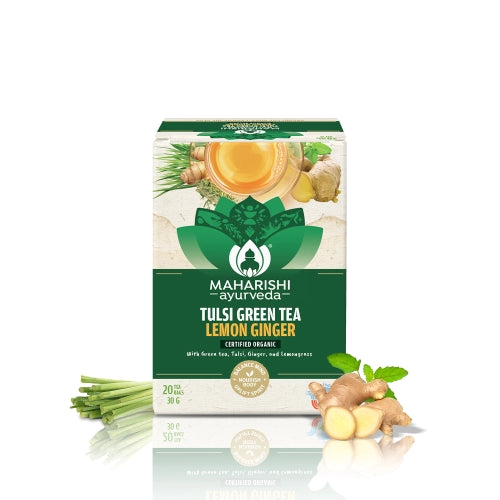
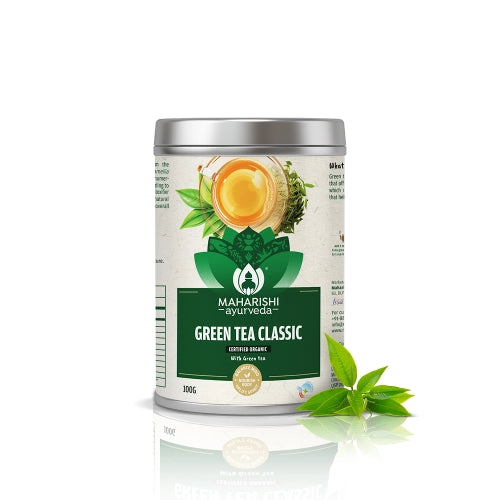
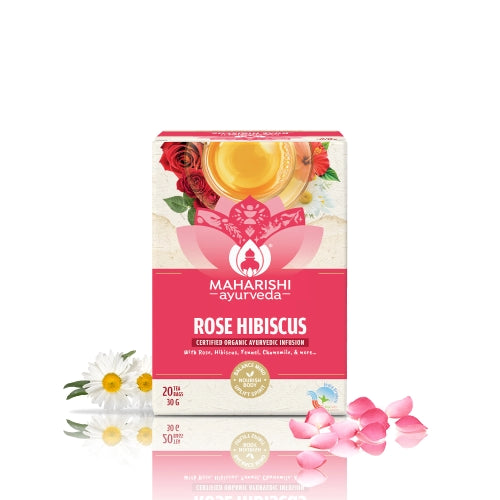
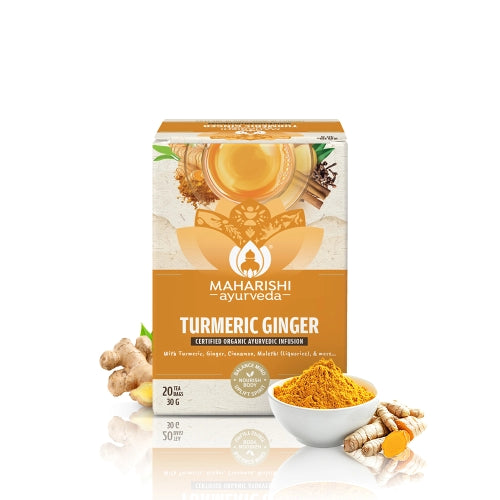
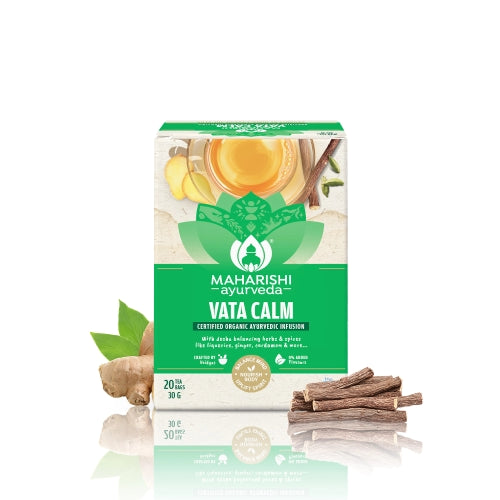
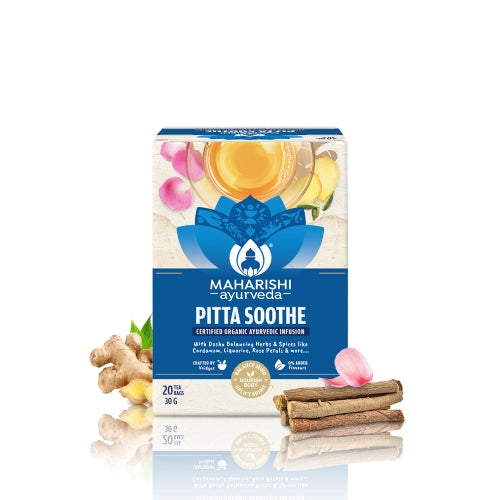
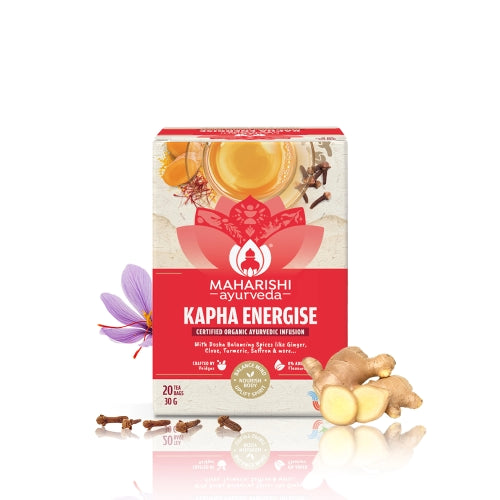




 Popular Read
Popular Read













































